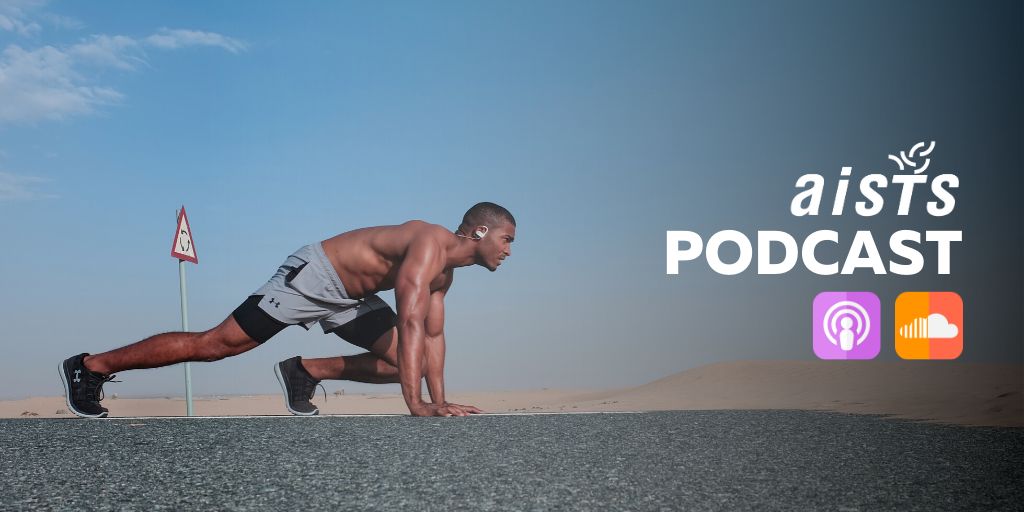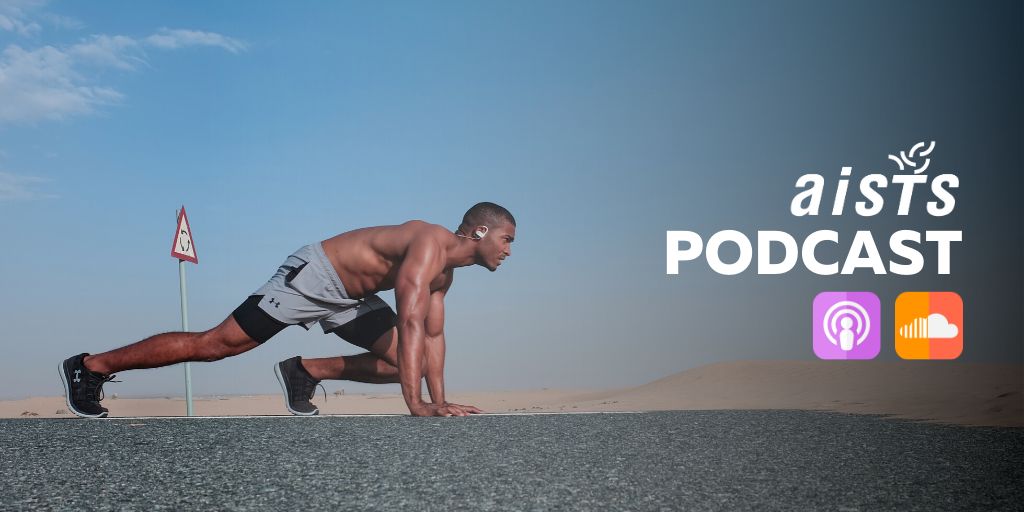
AISTS SPORT MEDICINE PODCAST #55
DOES ELITE SPORT LEAD TO BETTER OR WORSE HEALTH LONG TERM?
AISTS class of 2019’s Roberto Pitta and Surbhi Kuwelar delve into the topic of elite sports. Does it lead to better or worse long term health?
In this podcast, they discuss muscular-skeletal issues which can impact elite athletes as well as the mental health issues which are becoming more common with young athletes.
The AISTS Sport Medicine Podcast is recorded by participants of the AISTS Master of Advanced Studies in Sport Administration and Technology. It has recently been ranked as no.7 in the world’s best sport medicine podcasts.
The full transcript of this AISTS Medicine Podcast episode, you can read below:
Roberto: Hi everyone tuned in! Welcome to your weekly dose of medicine from non-doctors. We are here today to talk about how healthy it is in the long term to be an elite athlete.
Surbhi: Hi Beto! As athletes ourselves,1 perhaps we could start by thinking about what injuries we have or have had, that do or will impact us in our everyday life?
Roberto: Surbhi, I think depending on the sport, there are some injuries more common than others and some sports have higher injury risk, as shown by some studies.2 In my case specifically, I still have lower back pain that bothers me, but doesn’t affect daily life.
Surbhi: True. My knees feel old and replaceable. However, injury could impact many things long term, leading to muscular, skeletal, cardiovascular or mental problems and even affect length of an elite athlete’s life. We’ve seen many instances of cardiac arrest on the field, for example.
Roberto: That’s true. There are different types of injuries. But, if you look at Lindsey Vonn’s retirement, for example, it was purely due to musculoskeletal injuries – repeated fractures and knee surgery.3
Surbhi: But wait, hold that thought. We’ll come back to that in a minute. Let’s look at which athletes we are talking about. We are only looking at extremely high level of physical exertion (above 16 -20 hours a week) at national or international level, with usually support staff present.
Roberto: Since you started narrowing it down, let’s make it clear to our listeners that we’ll be discussing musculoskeletal problems like Lindsey Vonn’s or now Durant’s Achilles4 and Klay Thompson’s ACL,5 who knows when those will get better.
Surbhi: We will also briefly touch on mental health problems, which are increasingly seen in young elite athletes, Michael Phelps being a prime example.6
Roberto: But Surbhi, do you think athletes are aware or consider the injury risk?
Surbhi: Studies have shown that more elite athletes are more skilled and so the same level of risk is so to speak less risky for them, than for a beginner,7 for example. Alex Honnold,8 who free solos is a classic case of calculated risk taking by an experienced elite athlete, where one mistake is falling to your death.
Roberto: That’s true. Some factors that could impact directly this risk taken are social pressure, perfectionism, carefreeness, environment pressure. Durant, for example, played without being at 100% with a really high risk of a new injury or making the previous one worse.9 But I really hope he was aware of the risk he was taking, as his new injury has long term consequences on his future as athlete and otherwise.
Surbhi: To quote a very smart person, the question is whether the health benefits of sports participation outweigh the risk of injury and long-term disability.10
Roberto: Haha, that’s the IOC, no?
Surbhi: How do you know? No, but let’s focus. What do you think impacts whether or not athletes have long-term effects of musculoskeletal injuries? Do you think your back problem will persist?
Roberto: I think studies have shown, that my back is going to be problematic. No but seriously, studies show that effects differ based on (1) which sport11 (2) seriousness of the injury12 (3) and how long since the injury has been incurred, especially for joints.13 Elite NCAA athletes, for example, have sought professional help 14 times more than non-athletes for joint problems.14
Surbhi: The higher incidence of pain15 and joint problems does sound correct. For instance, I have been told to continue rehabilitation for my knee bone contusion indefinitely which includes specific strength work, warm up and cool down as well. So, effective rehabilitation and not coming back too early may also play a role on long-term health.
Roberto: Yes, Vonn’s retirement is almost entirely due to her 10-plus major injuries. She could still be competing, but she said in her retirement interview that her body was “screaming for her to stop”.16 Speaking of retirement, it must have affected her mentally as well.
Surbhi: Did you have mental health trouble around your retirement? I think you managed the transition quite well.
Roberto: I think the key is to plan and to prepare for it. As soon as I ended my athlete career, I was quickly occupied with work. Studies actually show that athletes suffer most around injuries, retirement approaching and dips in expected performance.17
Surbhi: Michael Phelps is a prime example of mental health issues after retiring from a long career. But also, an example of turning his life around.18 Not so well-off is Johnny Manziel, an NFL recruit whose early college fame and wealth got to his head and was then dropped by his team. He is still struggling and facing issues.19 Speaking of the NFL, they also actually have a relatively high concussion incidence.20 Do you think that it leads to mental health issues long term?
Roberto: That’s tough to say, but there has been no clear evidence linking concussions to depression, or other mental health problems,21 but they are definitely injuries with serious effects otherwise.
Surbhi: Concussions are a huge minefield by themselves to discuss, perhaps to be left for the next set of non-doctors to educate you on. Till then, consider carefully whether being an elite athlete is for you, or you may be in pain for a long time, like us. Until later!
Roberto: Goodbye everybody!
References
- Roberto is a retired Brazilian professional beach volleyball player. Surbhi is currently competes with the Swiss national ultimate frisbee team and club teams in Lausanne and India.
- See, for example, differing instances of abnormal ECG patterns across sports – Maron and Pellicia, “The Heart of Trained Athletes”, Contemporary Reviews in Cardiovascular Medicine (2006).
- Pennington, “Lindsey Vonn to Retire”, New York Times, February 1, 2019 available at https://www.nytimes.com/2019/02/01/sports/lindsey-vonn-retires.html (accessed June 19, 2019). Detailed injuries described in video available at https://www.nytimes.com/interactive/2018/02/20/sports/olympics/lindsey-vonn-downhill-injuries- skiing.html (accessed June 19, 2019).
- Associated Press, “Kevin Durant Confirms He Suffered Ruptured Right Achilles”, June 13, 2019 as available at https://www.nba.com/article/2019/06/12/warriors-durant-achilles-injury-update (accessed June 19, 2019).
- Associated Press, “Klay Thompson tears ACL in Game 6 of Finals”, June 14, 2019 as available at https://www.nba.com/article/2019/06/13/thompson-tears-ACL (accessed June 19, 2019).
- Newberry, “Michael Phelps opens up about his struggles with mental health”, May 22, 2018 available at https://www.boston.com/sports/olympics/2018/05/22/michael-phelps-depression-mental-health (June 19, 2019).
- See generally, Langseth and Salvesen, “Rock Climbing, Risk and Recognition”, Frontiers of Psychology (2018).
- Honnold has specifically addressed processing risk, most notably in this video production by eminent climbing journal Rock and Ice – see “Alex Honnold Explains the Distinction between Risk and Consequence”, Rock and Ice, January 30, 2014 available at https://rockandice.com/videos/climbing/alex-honnold-explains-the-distinction-between-risk-and-consequence/ (accessed June 19, 2019).
- See Associated Press, “Kevin Durant Confirms He Suffered Ruptured Right Achilles”, supra.
- Ljungqvist, Jenoure, Engebretsen et al., The IOC Consensus Statement on Periodic Health Evaluation of Elite Athletes: March 2009, British Journal of Sport Medicine (2009).
- Raty, “Lifetime Musculoskeletal Symptoms and Injuries among Former Elite Male Athletes”, Orthopedics and Clinical Science, International Journal of Sports Medicine (1997).
- McAllister et al., “Quality of life assessment in elite collegiate athletes”, American Journal of Sports Medicine (2001).
- Sorenson et al., “Holistic life-span health outcomes among elite intercollegiate student-athletes”, Journal of Athletic Training (2014).
- Study limited to NCAA Division I athletes across sports – see Sorenson et al., “Holistic life-span health outcomes among elite intercollegiate student-athletes”, supra.
- Texeria et al., Prevalance of Musculoskeletal Pain in Marathon Runners who Compete at the Elite Level, International Journal of Sports Physical Therapy (2016).
- Pennington, “Lindsey Vonn to Retire”, supra.
- Rice et al., “The Mental Health of Elite Athletes: A Narrative Systematic Review”, Sports Medicine (2016).
- Layden, After Rehabilitation, the best of Michael Phelps may lie ahead, Sports Illustrated (2015) available at https://www.si.com/olympics/2015/11/09/michael-phelps-rehabilitation-rio-2016 (accessed June 19, 2019).
- Associated Press, “Johnny Manziel released by Montreal Alouettes and barred from CFL”, The Guardian (February 27, 2019) available at https://www.theguardian.com/sport/2019/feb/27/johnny-manziel-released-by-montreal-alouettes-cfl (accessed June 20, 2019).
- Seifert, “NFL Concussions Continue to Rise”, ESPN (January 26, 2018) available at https://www.espn.com/nfl/story/_/id/22226487/nfl-concussions-rise-highest-level-league-began-sharing-data (June 20, 2019).
- Manley et al., A systematic review of potential long-term effects of sport-related concussion, British Journal of Sports Medicine (2017).
You can find more AISTS Sport Medicine podcast on our Soundcloud channel or on the Apple Podcast app. To learn more about the AISTS Master of Advanced Studies in Sport Administration and Technology, visit https://aists.org/education/masters-degree/
Photo Canva.





